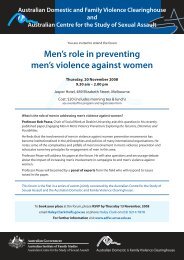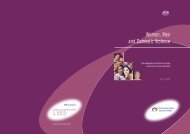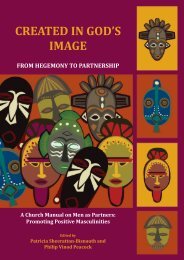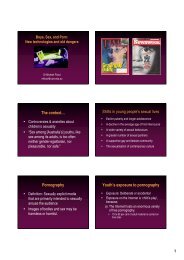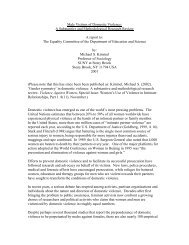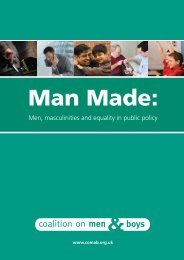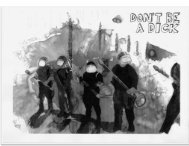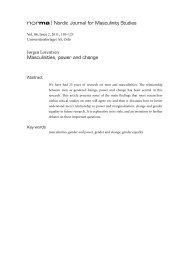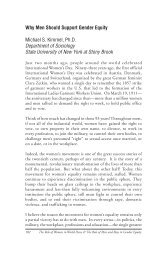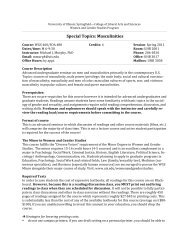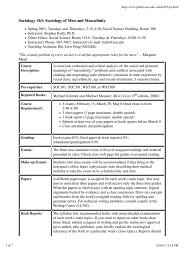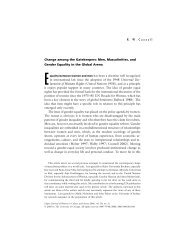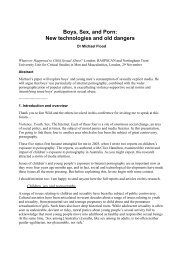Engaging Men and Boys in Refugee Settings - Women's Refugee ...
Engaging Men and Boys in Refugee Settings - Women's Refugee ...
Engaging Men and Boys in Refugee Settings - Women's Refugee ...
You also want an ePaper? Increase the reach of your titles
YUMPU automatically turns print PDFs into web optimized ePapers that Google loves.
change, <strong>and</strong> how change can be promoted through programmes. Expected programme<br />
outcomes <strong>and</strong> pr<strong>in</strong>ciples to be followed were then discussed. The World Health Organisation<br />
report was presented, with real life examples <strong>and</strong> statistics of violence aga<strong>in</strong>st women <strong>in</strong><br />
South Africa. Evaluations of various exist<strong>in</strong>g programmes were reviewed to highlight both the<br />
challenges <strong>and</strong> the reasons for optimism. The participants then reflected on the key features to<br />
successful programmes, such as the use positive <strong>and</strong> affirm<strong>in</strong>g messages, ecological/ systemsbased<br />
approaches <strong>and</strong> different social change strategies. The programmes must also take<br />
<strong>in</strong>to consideration that men are diverse, not a homogeneous group, <strong>and</strong> must be adapted<br />
to the particular context. The programmes must also be <strong>in</strong>formed by research <strong>and</strong> be under<br />
cont<strong>in</strong>uous evaluation.<br />
After lunch, an exercise was <strong>in</strong>itiated by Mr Jean-Pierre Kalala to discuss value statements<br />
regard<strong>in</strong>g gender. Various statements were presented <strong>and</strong> the participants had to take a st<strong>and</strong><br />
<strong>and</strong> argue for their po<strong>in</strong>t of view.<br />
Mr Bafana Khumalo then led a session of the connection between gender, religion <strong>and</strong> culture.<br />
He reviewed the issues of socialization <strong>and</strong> the <strong>in</strong>stitutions that contribute to this process. He<br />
also discussed how culture is dynamic <strong>and</strong> evolves over time as well as how culture is often<br />
romanticized <strong>and</strong> used to legitimize harmful traditional practices (such as child marriage, FGM,<br />
abduction etc). Proposed approaches <strong>in</strong>cluded start<strong>in</strong>g all development activities at the family<br />
level <strong>and</strong> to always <strong>in</strong>volve men <strong>and</strong> boys <strong>in</strong> programmes.<br />
The day was rounded up with the participants be<strong>in</strong>g grouped by regions (Eastern Africa,<br />
Southern Africa <strong>and</strong> the Great Lakes region) to draft regional plans of action on how to <strong>in</strong>volve<br />
men <strong>and</strong> boys <strong>in</strong> the work aga<strong>in</strong>st SGBV.<br />
Dur<strong>in</strong>g the review of the day, it was expressed that the participants liked the <strong>in</strong>teractive nature<br />
of the workshop, the group work, the facilitation, the venue, the practical examples given, <strong>and</strong><br />
that they especially appreciated the gender values exercise. They were, however, concerned<br />
about time-management, female representation <strong>and</strong> the participation of non-English speakers,<br />
<strong>and</strong> wanted to focus more on network<strong>in</strong>g.<br />
Day Two: Attitudes<br />
The morn<strong>in</strong>g review highlighted the participants’ learn<strong>in</strong>g experiences after the first day of the<br />
workshop. The discussion then led <strong>in</strong>to the issues of sexual orientation, how the participants<br />
feel about homosexuality at a personal level <strong>and</strong> whether they are comfortable to talk about<br />
it <strong>and</strong> deal with it <strong>in</strong> their daily work. Most of the participants seemed to acknowledge<br />
that homosexuality exists <strong>and</strong> raises relevant questions for them <strong>in</strong> their work. Many of the<br />
participants expressed that they were uncomfortable or uncerta<strong>in</strong> on how to deal with it, <strong>and</strong><br />
that homosexuality is not openly discussed. Many participants found it difficult to f<strong>in</strong>d the<br />
right words <strong>and</strong> term<strong>in</strong>ology to discuss the topic. One of the participants told a personal story<br />
about a homosexual man who she felt the office had let down, as they had overlooked his<br />
requests until he was physically assaulted by a group of other refugee men. Another participant<br />
expressed that he had seen refugees be<strong>in</strong>g isolated <strong>and</strong> marg<strong>in</strong>alized <strong>in</strong> their societies due to<br />
rumors about their sexual orientation. Several participants further mentioned that homosexual<br />
women have been killed <strong>in</strong> South Africa due to their sexual orientation <strong>and</strong> that there have<br />
been reports that men have also raped them “to cure them”. It was then discussed what our<br />
role as “changemakers” should be <strong>in</strong> address<strong>in</strong>g homophobia <strong>and</strong> how it can be <strong>in</strong>cluded <strong>in</strong><br />
the country’s action plans. The media’s role was also discussed <strong>and</strong> it was suggested that the<br />
participants work pro-actively with the media to give them the right story.<br />
Mr Dale Buscher then reviewed the concept of gender <strong>and</strong> how the media <strong>in</strong>fluences our<br />
<strong>Engag<strong>in</strong>g</strong> <strong>Men</strong> <strong>in</strong> <strong>Refugee</strong> Sett<strong>in</strong>gs 7



